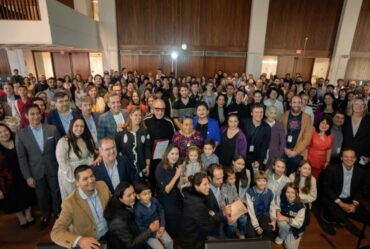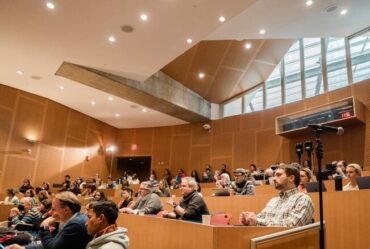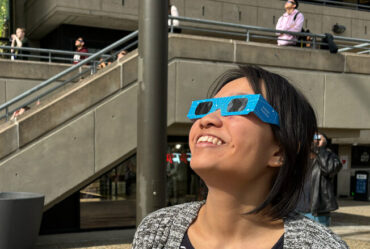
Annual Festival of Learning discusses applications of generative artificial intelligence inside and outside of the classroom
Aikawa: “I think we need to coexist…we cannot innovate pedagogy.”
The annual Festival of Learning was held Jan. 31 at the Stata Center to discuss applications of generative artificial intelligence (GenAI) in academic settings. Members of the MIT community congregated to hear panelists discuss how they implemented GenAI in classrooms and research.
The Festival of Learning events began in 2017. Chris Cappozola, a Course 21H professor and Senior Associate Dean for Open Learning, moderated the panel for the second straight year. The panelists came from a variety of disciplines ranging from Electrical Engineering and Computer Science to Global Languages.
The speakers were Ana Bell, a Course 6 senior lecturer teaching 6.100A/B (Introduction to Computer Science Programming in Python); Melissa Webster, a lecturer in Managerial Communication at Sloan; Jesse Thaler, a professor in Course 8 professor specializing in particle physics; and Takako Aikawa, a Japanese language senior lecturer who heads the Japanese language curriculum.
Bell commenced the panel by speaking about how students in her Python introduction class use GenAI for help in their work.
“The way that our course is structured, I think we’re pretty well set-up to coexist with GenAI. We have a variety of assignments that students do at home and in the classroom,” Bell said. “Generally, we don’t care if they use GenAI at home on the problem sets because the problem sets are large enough that GenAI won’t really help them that much.”
However, although GenAI has its uses, Bell stated that students sometimes violated academic integrity policies by using GenAI for in-person work. “It’s really hard to keep track of students who violated [academic integrity policies],” Bell said. As such, students are no longer allowed to use outside programming environments and instead have to rely solely on the classwork web page.
Webster also shared her own difficulties regarding academic dishonesty as a Sloan professor. She said that although there are benefits to using GenAI, tools including ChatGPT could be used nefariously. Additionally, Webster discussed how undergraduate researchers are trying to combat academic dishonesty in the context of AI.
“Two students were interested in the topic of AI detection,” Webster said. “[They] want to know what to do if we were accused of plagiarism. [They] actually want to have a defense by understanding how [GenAI] works.”
Inspired by their work, Webster sought to highlight GenAI as a necessary tool for success in the workplace.
“My assumption with the material and the courses I teach is that students in the workplace will need to be competent with GenAI for these things in order to be competitive in the workplace,” Webster stated. “So they need to know how to use these.”
Beyond the classroom, GenAI is also helping scientific research. As a theoretical physicist, Thaler finds GenAI particularly useful with generative modeling.
“I use GenAI tools, but in a scientific way in order to make predictions about what might happen at the Large Hadron Collider,” Thaler said. He added, “People generate synthetic universes and synthetic quantum mechanical field configurations. Generative AI as a scientific tool is absolutely essential.”
A subset of GenAI, large language models, have become powerful tools as they draw upon an expanse of text-based works. Aikawa confirmed this, saying that she uses ChatGPT herself to encourage her students to improve their linguistic skills.
“I asked my students to compare and analyze the differences between their original sentences and ChatGPT alternative ones,” Aikawa said when talking about an assignment in one of her classes. She added, “I thought this type of activity enhances not only their linguistic skills, but also stimulates their metacognitive or analytical thinking.”
Moreover, Aikawa’s use of GenAI inspired her to think philosophically about the nature of learning languages — if there is GenAI now to help with different languages, why bother learning them?
Aikawa asked the audience, “What is learning? In particular, for my case, what is the added value? Why do people have to learn foreign languages?”
“I know some language instructors have concerns and skepticism about adopting new technology,” Aikawa stated. “I believe, like [as Webster] said, I think we need to coexist and then, otherwise, we cannot innovate pedagogy.”
The next Festival of Learning will continue to be hosted by Open Learning. Sheryl Barnes, the Open Learning Director for Digital Learning in Residential Education, said that the themes for the next Festival will be a “timely topic that will bring faculty, students, and staff together to focus on talking about teaching and innovating.” Barnes added that Open Learning is keen to collaborating and convening with students.


